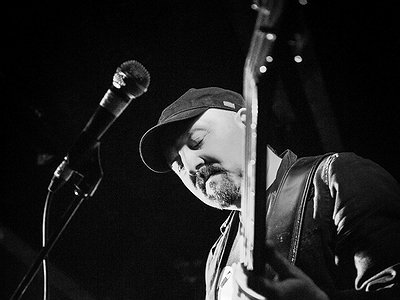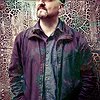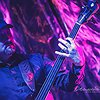How do you make use of technology? In terms of the feedback mechanism between technology and creativity, what do humans excel at, what do machines excel at?
The biggest plus of a computer based set up is that complex editing can become very simple and also it lends itself to recombination quite easily. In the rehearsal room, for a band to hear an idea of how a given chord or section change might sound like, you’d all have to play it and then make decisions. With a computer you can make multiple arrangement ideas very quickly and pick the best option.
The big difficulty with using computers is that the music becomes visual. Most of the time you’re looking at a screen, and a visual representation of the sound, which you never would have done in the days of tape or ADAT. The best solution is sometimes to simply turn your monitor off when you’re listening back!
Also, the unlimited options available on even a simple DAW can completely stall your decision making process or lead you into a rabbit hole of forever changing a miniscule aspect of the big picture that no one but you will ever notice. I am just as guilty as anyone else of falling into this trap!
Production tools, from instruments to complex software environments, contribute to the compositional process. How does this manifest itself in your work? Can you describe the co-authorship between yourself and your tools?
There are times when, in a search for a new idea, I’ll take a random approach to processing some audio, perhaps a loop or sample to try and find an appealing sound. At other times I’ll consciously limit what tools I’ll use to make the most of a limited pallet.
Early in lockdown, I found it hard to concentrate, so I decided to explore stripping things right back to their underlying fundamental elements, completely limiting myself to the idea of drones and pulses, mostly made using the bass. In this case, delay became a very important tool, creating the underlying pulsing basslines using a series of pattern delays I spent some time refining. These ideas became a series of recordings entitled “Points of Origin”.
Other times though, I might explore a different bass sound by doing something more physical like using a foam mute to cut the sustain or sometimes even retuning to find different harmonics or different notes falling under familiar finger patterns.
Collaborations can take on many forms. What role do they play in your approach and what are your preferred ways of engaging with other creatives through, for example, file sharing, jamming or just talking about ideas?
There are some musicians who shy away from improvisation and think everything is best when it’s highly structured and well thought out, and others who only want to create in the moment. I’ve worked with both extremes and what matters to me is the result and the chemistry rather than the process. Certainly it’s possible to collaborate with people you are quite remote from, but usually even a brief period of time spent together does create a better understanding. I’ve always enjoyed the social aspect to music, and there’s a Gestalt aspect to collaborations, an unquantifiable thing that exists between partners which can’t be easily expressed or even understood.
Like any good team or partnership, the best enable each person to contribute something better, or perhaps just quite different than they would do on their own. That’s what I always hope to gain from working with others: To come up with something I wouldn’t otherwise. I also enjoy a simple jam though. With the Eternal Return sessions I felt there was a good balance between improvising around the basic structures and trying to expand it while keeping it all direct and simple.
Could you take us through a day in your life, from a possible morning routine through to your work? Do you have a fixed schedule? How do music and other aspects of your life feed back into each other - do you separate them or instead try to make them blend seamlessly?
The reason I called my studio Nightspace was originally because, due to having young kids, my only truly undisturbed times to work on music or to refine the art and process of recording were in the dead of night! I’ve always been an Owl rather than a Lark so it suited me anyway.
I am also not really one for set routines, although the present lockdown has kind of forced that on me, but I do try and keep a regular creativity schedule, the “sketch time”, as I’ve found things come easier the more often you can set that time aside.
One thing the current lockdown situation has brought home to me is just how much I used get out of a simple walk around central London. It’s a city full of possibilities, a magnet for creatives and I always find lots of places to discover.
Could you describe your creative process on the basis of a piece or album that's particularly dear to you, please? Where did the ideas come from, how were they transformed in your mind, what did you start with and how do you refine these beginnings into the finished work of art?
Last year, making the album “Allusions” came very quickly once I got started, but the idea of making a collection of solo bass recordings had been brewing for a long time.
I wanted to explore effects and the sonic possibilities of reverb on bass and also suspended time, which is not the usual bass like role which requires rhythmic precision. Also, I can’t usually use long reverb effects on the bass in an ensemble situation, as it can end up sounding like a mess, but the sound really appeals to me, especially on the fretless bass.
For most of the pieces, once I had a loop I was happy with, either on a cassette tape loop (recorded on my ancient 4 track) or a looping device. It was a fast process, improvising and then later processing the recorded sounds again with tape, and perhaps more delay and reverb. The decays, distortions and sonic imperfections which I would usually spend a lot of time trying to eradicate were all part of the fnished piece, and an important part too.
I think the dawning realisation that I was going to be unable work with other people, in real space and time for a while spurred me on, too. It was very satifying and I had a lot of positive feedback - much more than I expected for such a self indugent exercise.
There are many descriptions of the ideal state of mind for being creative. What is it like for you? What supports this ideal state of mind and what are distractions? Are there strategies to enter into this state more easily?
I don’t have any strategies, or at least, none that work all the time. But I like to think creativity is a natural state, although a lot people think its not for them. It’s creative to look in your kitchen cupboard and cook something with leftovers, or to be able to mend something when your toolbox goes missing.
Unexpected simple ideas have a value. A friend who owned a lurcher the size of a small cow put his door handles on upside down to stop the dog from pushing them down and going into certain rooms (usually eating whatever was in there!), so there’s a parallel with creativity and problem solving too.
Most of us think we’d be more creative if we had more time, or we had a beachside house, or a forest lodge to write our novels or make our albums, but I think the real key is regularity of effort, combined with the space for allowing yourself to fail.
In composing, it sometimes feels like the answers are already there, you just need to discover them, usually by listening intently, dispassionately and without too much attachment. In a similar vein, if I am looking for something in my house and can’t find it, I’ve learnt to stop looking and do something else. The location of keys / wallet / usb stick / TV remote or whatever will usually then pop into my mind.





